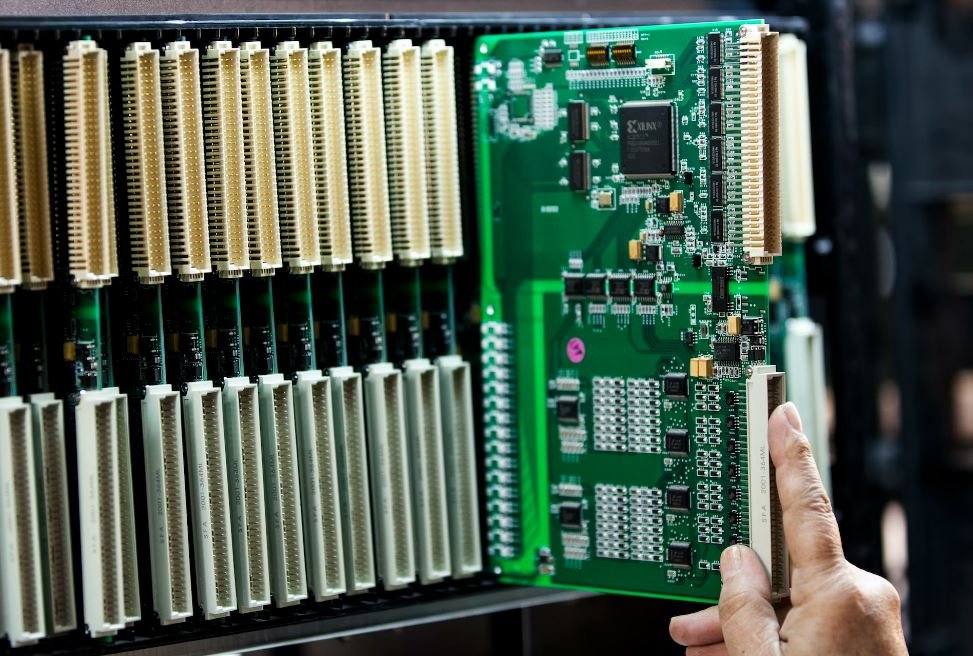Top AI-Related Stocks
Artificial Intelligence (AI) is a rapidly growing field that has gained significant attention in recent years. As companies across various industries embrace AI to enhance their operations and improve efficiency, the demand for AI-related stocks has soared. In this article, we will take a closer look at some top AI-related stocks that investors should keep an eye on.
Key Takeaways:
- The AI market is expected to reach $190.61 billion by 2025, with a CAGR of 36.62% during the forecast period.
- Investment in AI can lead to significant potential for growth and higher returns.
- Companies that focus on AI technology and products are well-positioned in the market for long-term success.
1. Alphabet Inc. (GOOGL)
Google’s parent company, Alphabet Inc. (GOOGL), is a major player in the AI space. With its subsidiary, Google, being a pioneer in AI research and development, the company is at the forefront of innovation. Its AI technologies are utilized in various products like Google Search, Google Assistant, and Google Maps, enabling Alphabet Inc. to capitalize on the growing demand for AI-driven solutions. Furthermore, its cloud division, Google Cloud, offers AI and ML tools to other businesses, driving additional revenue.
Google’s AI-powered voice assistant, Google Assistant, has over 500 million active users worldwide.
2. NVIDIA Corporation (NVDA)
NVIDIA Corporation (NVDA) is a leading chipmaker that supplies GPUs (Graphics Processing Units) for AI-related applications. The company’s GPUs are widely used in data centers, autonomous vehicles, and gaming platforms, among other sectors. As AI requires significant computational power, NVIDIA’s high-performance GPUs are instrumental in accelerating AI training and inference. With strong demand for its products and a solid reputation in the industry, NVIDIA has positioned itself as a key player in the AI market.
NVIDIA’s data center revenue, driven by AI-related applications, grew by 55% year-over-year in its fiscal year 2021.
3. Amazon.com, Inc. (AMZN)
Amazon.com, Inc. (AMZN) is not only an e-commerce giant but also a major player in the AI space. The company’s AI-powered virtual assistant, Alexa, has gained widespread recognition and popularity. Alexa is integrated into Amazon’s line of Echo devices, offering users a convenient and smart voice-controlled experience. Additionally, Amazon Web Services (AWS) provides AI services such as natural language processing, machine learning, and computer vision, catering to businesses across various industries.
Alexa has over 100,000 skills and can control over 85,000 smart home devices.
Table 1: AI Market Forecast
| Year | Market Size (in billion USD) | CAGR |
|---|---|---|
| 2019 | 39.9 | – |
| 2020 | 48.7 | 22.6% |
| 2021 | 58.3 | 19.7% |
| 2022 | 71.0 | 20.1% |
4. International Business Machines Corporation (IBM)
International Business Machines Corporation (IBM) has a strong presence in the AI space through its Watson platform. Watson is an AI-powered supercomputer that provides a range of cognitive computing services, including natural language processing, data analysis, and machine learning. IBM has also partnered with various companies and institutions to deploy Watson’s capabilities in different domains, such as healthcare and finance. With its vast AI expertise and comprehensive AI solutions, IBM remains a significant player in the AI market.
IBM’s Watson Discovery platform uses AI to analyze unstructured data, allowing businesses to gain valuable insights from large volumes of information.
Table 2: Revenue Growth of Key AI Players (2019-2020)
| Company | Revenue Growth |
|---|---|
| Alphabet Inc. (GOOGL) | 13% |
| NVIDIA Corporation (NVDA) | 53% |
| Amazon.com, Inc. (AMZN) | 37% |
| International Business Machines Corporation (IBM) | 0.2% |
5. Microsoft Corporation (MSFT)
Microsoft Corporation (MSFT) is a tech giant that has made substantial investments in AI. The company’s AI offerings include Azure AI, which provides a range of AI services to businesses, and Cortana, Microsoft’s virtual assistant. Microsoft also develops AI-powered applications like Office 365, which utilizes machine learning algorithms to enhance productivity and efficiency. With a vast user base and a comprehensive suite of AI solutions, Microsoft is well-positioned to benefit from the growing AI market.
Microsoft’s Azure AI has over 1,200 AI models and cognitive capabilities.
Table 3: Market Share of Virtual Assistant Technologies (2021)
| Technology | Market Share |
|---|---|
| Google Assistant | 24.5% |
| Amazon Alexa | 16.6% |
| Microsoft Cortana | 12.7% |
| Apple Siri | 12.5% |
In conclusion, the AI market presents exciting investment opportunities, and these top AI-related stocks have demonstrated their potential for growth and success in the ever-expanding AI landscape. As AI continues to transform industries, companies that leverage AI technologies and develop innovative AI-driven products are well-positioned to thrive in the market.

Common Misconceptions
AI Stocks are Only for Tech Companies
One common misconception is that AI-related stocks are only relevant to tech companies. However, the impact of artificial intelligence is not limited to the technology sector alone.
- Many sectors like healthcare and finance also utilize AI technology extensively.
- AI-enabled solutions can enhance productivity and efficiency in various industries.
- Investing in AI stocks can be beneficial for a diversified portfolio across different sectors.
AI Stocks Are Highly Volatile
Another misconception surrounding AI stocks is that they are extremely volatile. While it is true that the technology sector in general can experience volatility, this does not apply universally to all AI-related stocks.
- Not all AI stocks are equally volatile; it depends on the company and market conditions.
- Established AI companies with a solid track record may be less volatile than emerging startups.
- Investors can mitigate risk by diversifying their portfolio and investing in a mix of AI-related stocks.
AI Stocks Will Replace Human Workers
One common misconception is that AI stocks and advancements will lead to widespread job loss, with machines and algorithms replacing human workers. However, the reality is more nuanced.
- AI technology is designed to augment human capabilities, not necessarily replace them entirely.
- Automation may lead to job shifts and changes in work processes, but it also creates new employment opportunities.
- Investing in AI stocks can provide exposure to companies driving innovation and economic growth.
Only Huge Tech Giants Have AI Stocks
Many people believe that only massive tech giants can offer AI-related stocks. While it is true that companies like Google, Microsoft, and Amazon are prominent players in the AI space, there are also other options available for investors.
- AI startups and smaller companies focused on artificial intelligence also offer investment opportunities.
- It’s important to research and explore the market to identify promising AI stocks beyond the industry giants.
- Investors can consider consulting with financial advisors to identify lesser-known AI stock options.
AI Stocks Are Only for Expert Investors
Some perceive AI stocks as complex and suitable only for expert investors. However, this misconception overlooks the fact that AI-related stocks can serve as a viable investment option for a wide range of investors.
- Investors can educate themselves about AI technology and stay informed about industry trends.
- Many brokerage platforms provide user-friendly interfaces and research tools to support investing in AI stocks.
- Long-term investors can benefit from keeping an eye on the AI sector and making informed investment decisions.

Artificial Intelligence (AI) Revenue by Country
In this table, we present the revenue generated by different countries in the field of Artificial Intelligence (AI). It provides insights into the global distribution of AI revenue and highlights countries leading in this domain.
| Country | AI Revenue (in billions USD) |
|---|---|
| United States | 67.8 |
| China | 15.5 |
| Japan | 9.7 |
| Germany | 5.3 |
| United Kingdom | 4.8 |
Top Companies in the AI Industry
This table showcases some of the leading companies that are making significant strides in the AI industry. These companies are actively involved in developing innovative AI solutions and technologies.
| Company | Market Capitalization (in billions USD) |
|---|---|
| Alphabet Inc. | 1,582 |
| Microsoft Corporation | 1,635 |
| IBM | 126 |
| Intel Corporation | 214 |
| NVIDIA Corporation | 420 |
AI Patent Applications by Company
This table presents the number of AI patent applications filed by different companies. It provides insight into the level of innovation and intellectual property development happening in the AI sector.
| Company | Patent Applications |
|---|---|
| IBM | 1,453 |
| Microsoft Corporation | 1,267 |
| Google LLC | 898 |
| Samsung Electronics | 784 |
| Intel Corporation | 629 |
AI Investments by Venture Capital Firms
This table highlights the investments made by venture capital firms in AI-related startups. It demonstrates the financial support and interest in emerging AI technologies and their potential for growth.
| Venture Capital Firm | Investment Amount (in billions USD) |
|---|---|
| Sequoia Capital | 14.7 |
| Andreessen Horowitz | 8.9 |
| Khosla Ventures | 6.1 |
| GV (Google Ventures) | 5.4 |
| Intel Capital | 4.3 |
AI Applications in Healthcare
This table provides examples of AI applications in the healthcare industry. It showcases how AI is revolutionizing healthcare delivery, diagnostics, and patient care.
| Application | Description |
|---|---|
| Medical Imaging Diagnosis | AI algorithms analyzing medical images to aid in accurate diagnosis of diseases. |
| Drug Discovery | Utilizing AI to accelerate the discovery and development of new drugs. |
| Virtual Health Assistants | AI-powered chatbots assisting patients with virtual consultations and medical queries. |
| Personalized Medicine | AI analyzing patient data to tailor personalized treatment plans and interventions. |
| Healthcare Operations Optimization | AI-driven systems enhancing hospital workflows and resource allocation. |
AI Adoption in Manufacturing
This table demonstrates how AI adoption is transforming the manufacturing sector. It provides examples of AI applications that increase efficiency, optimize production, and improve quality control.
| Application | Description |
|---|---|
| Quality Control | AI-based systems inspecting products to identify defects and ensure quality standards. |
| Predictive Maintenance | Using AI algorithms to predict machinery failures, reducing downtime and costs. |
| Supply Chain Optimization | AI optimizing inventory management, demand forecasting, and logistics for improved efficiency. |
| Robotics and Automation | AI-powered robots streamlining repetitive tasks and increasing productivity on assembly lines. |
| Energy Consumption Optimization | AI systems analyzing data to optimize energy usage and reduce manufacturing costs. |
AI in Financial Services
This table highlights the various applications of AI in the financial services industry. It showcases how AI is revolutionizing banking, investment, and customer service in the financial sector.
| Application | Description |
|---|---|
| Fraud Detection | AI algorithms analyzing vast amounts of data to detect and prevent fraudulent activities. |
| Algorithmic Trading | Using AI to automate trading decisions and optimize investment strategies. |
| Virtual Assistants | AI chatbots providing personalized financial advice and support to customers. |
| Credit Scoring | AI-based credit assessment models analyzing creditworthiness and predicting default risk. |
| Risk Management | AI tools assessing and managing financial risks, improving decision-making processes. |
Ethical Concerns in AI Development
This table identifies some of the ethical concerns arising from AI development and implementation. It sheds light on potential challenges and prompts discussions around responsible AI deployment.
| Concern | Description |
|---|---|
| Job Displacement | The impact of AI on employment and the need for retraining and job creation. |
| Data Privacy | The ethical handling and protection of personal data used by AI systems. |
| Algorithm Bias | The potential for AI algorithms to exhibit discriminatory or biased behavior. |
| Autonomous Weapons | The potential risks associated with the development of autonomous AI-powered weapons. |
| Transparency and Accountability | The need for transparency and accountability in AI decision-making processes. |
Future Growth Forecasts for AI Market
This table presents the future growth forecasts for the global AI market. It provides insights into the projected expansion and potential opportunities in this rapidly evolving field.
| Forecast Year | Expected Market Size (in billions USD) |
|---|---|
| 2022 | 190 |
| 2025 | 314 |
| 2030 | 709 |
| 2035 | 1,195 |
| 2040 | 3,091 |
The article “Top AI-Related Stocks” highlights key aspects of the AI industry, including revenue by country, top companies, patent applications, investments, applications in various sectors, ethical concerns, and future growth forecasts. The table-driven approach provides relevant data and insights, making the article informative and engaging. As AI continues to advance, these trends and statistics can help readers understand the current state and future potential of the AI market.
Top AI-Related Stocks
Frequently Asked Questions
Which companies are considered top AI-related stocks?
Some of the top AI-related stocks include Tesla, NVIDIA, Amazon, Alphabet, IBM, Microsoft, and Apple.
What is the benefit of investing in AI-related stocks?
Investing in AI-related stocks can offer potential growth opportunities due to the increasing adoption of artificial intelligence technologies across various industries.
How can I buy AI-related stocks?
You can buy AI-related stocks through a brokerage account or an online trading platform.
What factors should I consider before investing in AI-related stocks?
Some factors to consider are company financials, growth potential, market competition, technological advancements, and regulatory landscape.
Are AI-related stocks risky investments?
All investments carry some level of risk. AI-related stocks can be considered more volatile due to the rapid evolution of the technology and the market.
Do AI-related stocks pay dividends?
Not all AI-related stocks pay dividends. Some companies reinvest their profits into further growth and development.
What is the long-term growth potential of AI-related stocks?
AI-related stocks have significant long-term growth potential as artificial intelligence becomes integrated into numerous industries, driving innovation and efficiency.
Are there any risks associated with AI-related stocks?
Some risks include regulatory challenges, ethical concerns, competition, and the possibility of AI not meeting the heightening expectations.
Can AI-related stocks benefit from future advancements in AI technology?
Yes, as AI technology advances, companies focusing on AI-related solutions and services have the potential to benefit from increased demand and broader applications.
Should I consult a financial advisor before investing in AI-related stocks?
It is generally beneficial to consult a financial advisor who can provide personalized advice based on your individual financial goals and risk tolerance.




